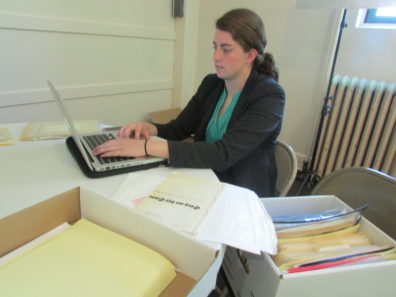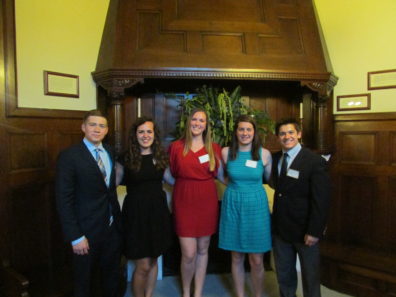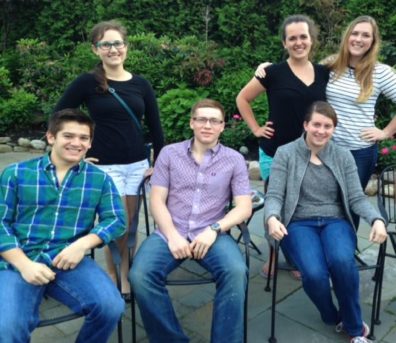and
This summer, the Robert H. Jackson Center welcomed six interns. The internship program is a vital part of our educational programming. The interns will spend the summer aiding the Jackson Center with various projects, all the while furthering their own education of Justice Jackson’s legacy. Each intern has included a personal reflection of how they find Robert H. Jackson’s legacy relevant in our American Political system.
Thomas Campion, from Jamestown NY, is a rising junior at Hobart College where he majors in History with a minor in Law and Society. Thomas’s project this summer is conducting research and collecting background information on the individuals headlining the Center’s summer events. Jackson’s involvement in the notable Brown v. Board of Education Supreme Court Case of 1952, in my opinion, has had the most significant impact on today’s American political system. The Supreme Court’s decision to declare segregated public schools as unconstitutional fundamentally shifted the course of American legal and social history. Not only did the unanimous decision of Jackson and the Supreme Court signify a monumental victory for the Civil Rights Movement, but the case upheld the ideals of equality and liberty for which Justice Jackson embodied.

Megan Feeney, Pheonix Arizona, is a rising junior at Allegheny College studying Political Science, with minors in History and Religious Studies. Megan will spend her summer cataloging the photographs and documents within the Robert H. Jackson Center Archive. Jackson’s opinion regarding West Virginia State Board of Education v. Barnette continues to play a significant role within the modern American political system. The court’s decision protects students from facing expulsion when failing to salute or pledge allegiance to the American Flag. While this case contained a religious component, pertaining to the beliefs of Jehovah’s Witnesses, the ruling emphasizes the First Amendment right regarding freedom of speech. Jackson’s involvement helped to instill the importance of defending individual liberties, even over the desire for national unity.
Ashley Mulryan, Olean NY, is also a rising junior at Allegheny College majoring in International Studies with minors in Spanish and Music. Ashley’s project this summer is to launch the new website. I believe Justice Jackson’s most lasting legacy in the American political system was his aversion to politics while still maintaining his faith and overall duty to the legal system. President FDR wanted Jackson to become governor of New York State to fast track to the White House, but Jackson’s love of the law and his sense of duty to the President’s cabinet during World War II was where he remained. When Robert H Jackson became associate Justice of the Supreme Court, he commented that his greatest tie was not to the Democratic party but to the Constitution and the American People.

Emily Rajakovich, Pittsburgh PA, is the third Allegheny College rising junior intern. Emily is working toward a double major in Political Science and History with a minor in Dance and Movement Studies. She will spend her time researching and writing articles for the new website regarding the upcoming events and speakers this summer and how they relate to the legacy of and commemorate the memory of Robert H. Jackson. I greatly respect Jackson’s legacy, specifically in his writings and opinions that have held steadfast throughout our changing political atmosphere. Jackson’s dissent in Korematsu v. the United States and his warnings of a broadening interpretation of the reach of executive power are extremely relevant in contemporary politics. His concurring opinion in the Youngstown Steel Seizure Case is still used by the Supreme Court when evaluating executive power which demonstrates his ability to understand the law in a complex way.
Ryan Schutte, Lakewood NY, is a rising junior at Dickinson College where he is studying Economics with double minors in History and Math. Ryan will be spending the summer going through some of the big events the Jackson Center has organized such as the Chief Justice Rehnquist and Chief Justice Roberts visits and documenting how they happened and what happened. He will be working with the Defenders of Freedom project, as well. I believe Jackson’s involvement in West Virginia State Board of Education v. Barnette has had the most lasting legacy on the American political system. Just three years prior in Minersville Board of Education v. Gobitis, the Supreme Court ruled against the Gobitas family and determined that national unity took precedent over individual religious freedom. The Barnette case reversed this decision and has become a symbol for every American’s right to believe or practice the ideas or faith that they choose. Even further, Jackson wrote the opinion of this monumental decision, and an excerpt is engraved on the flagpole outside of the Robert H. Jackson Center.

Molly White, Portage MI, a rising third year law student at Syracuse University College of Law, is the law intern this summer. She is working on organizing and writing descriptions of the International Humanitarian Law Dialogs. As well, she is writing a paper cataloging the relationship between the United States and the International Criminal Court. Additionally she will expand upon a paper concerning Forum Non Conveniens and whether a US person can sue a company incorporated in the US for a tort committed abroad while aiding or abetting a party in a foreign civil war. The paper will use the Syrian conflict as a case study. Having read Jackson’s concurrence in Youngstown Sheet and Tube Co. v. Sawyer in the majority of my classes during my first two years at Syracuse, I cannot help but have an affinity for that opinion. Jackson’s division of the President’s powers into three categories, specifically the zone of twilight where the President acts in absence of a congressional grant or denial of authority, established a framework for analyzing foreign relations, national security powers, and personal liberties issues.

